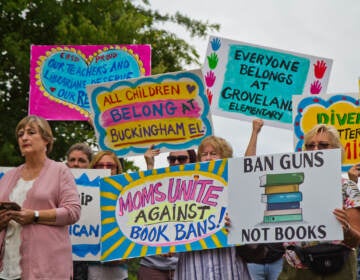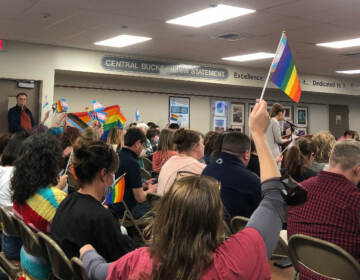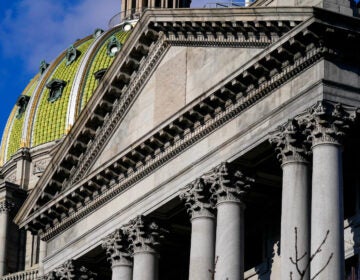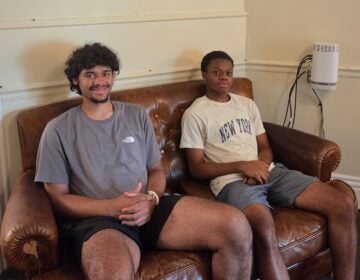‘It’s just getting worse.’ Central Bucks passes policy censoring class materials with ‘sexualized content’
The Central Bucks policy “effectively bans human development and sex education in the schools,” one expert said.
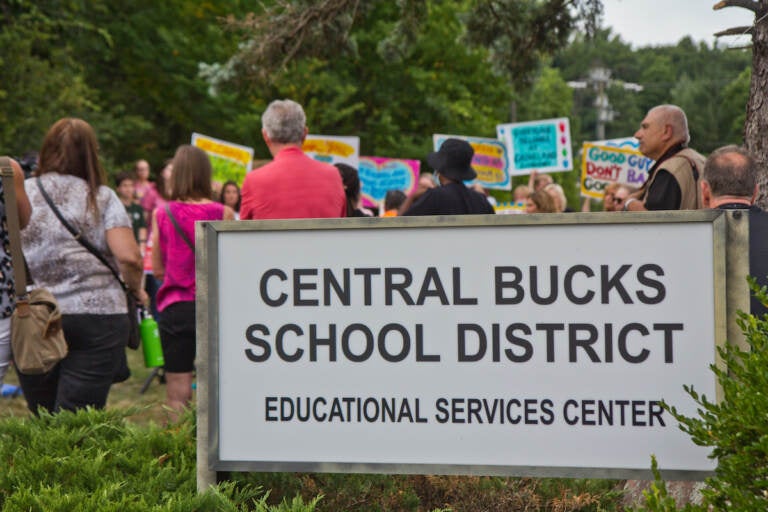
File photo: Parents, students and teachers rallied ahead of the Central Bucks School District’s vote to remove books perceived to have sexualized content from their libraries outside the district’s headquarters in Doylestown on July 26, 2022. (Kimberly Paynter/WHYY)
Got a question about life in Philly’s suburbs? Our suburban reporters want to hear from you! Ask us a question or send an idea for a story you think we should cover.
Taking parents by surprise, the Central Bucks School District this week passed another policy censoring school materials that contain “sexualized content.”
The new policy focuses on “district-wide approved materials,” defined as textbooks and “nonfiction and fiction books, magazines, reference books, supplementary titles, multimedia and digital materials, software, maps, and any other instructional material not otherwise covered in the textbook policy.”
Policy 109.1 by WHYY News on Scribd
The policy first showed up in a May policy committee meeting, and the school board passed it in a 6-3 vote on Tuesday.
The policy “effectively bans human development and sex education in the schools,” said Sharon Ward, senior policy advisor for the Education Law Center of Pennsylvania.
It also raises concerns over “excluding and stigmatizing LGBTQ+ people,” said Marlene Pray, a parent in the district and the regional LGBTQ+ youth education coordinator for Planned Parenthood Keystone.
For each grade level, the policy states, the superintendent “shall not recommend” certain materials using vague criteria reminiscent of the library book policy passed on July 26. The ACLU has said this kind of criteria gives decision makers “unlimited power and authority to get rid of “whatever they don’t like”.
The policy prohibits:
- For high school students, materials with “visual or visually implied depictions of sexual acts” and “explicit written descriptions of sexual acts, except for the purposes of teaching students to avoid and report molestation or education about the procreative sex act for purposes of science and health instruction.”
- For middle school students, “visual or visually implied depictions of sexual acts or simulations of such acts.”
- For elementary, “visual depictions of nudity or implied nudity — not including diagrams for educating about anatomy for science and health instruction or breastfeeding or content relating to classical works of art.”
For all grade levels, the policy dictates that teachers must get parental consent before they can use certain materials.
The criteria necessitating parental consent varies:
- For high schools, it’s materials with “explicit written descriptions of sexual acts or visual depictions of nudity.”
- For middle schools, it’s materials with “implied written descriptions of sexual acts or implied visual depictions of nudity.”
- For elementary schools, it’s materials with “implied written descriptions of sexual acts for the purposes of teaching students to avoid or report molestation, any diagrams for educating about anatomy for purposes of science and health instruction, and any visual depictions of nudity or implied nudity relating to classical works of art.”
This “opt-in” approach to education veers away from the more common “opt-out” policy that most Pennsylvania schools use for sex education. According to the Sexuality Information and Education Council of the United States, “opt-in policies create unnecessary hurdles that prevent students from accessing the sex education they have a right to receive. They are designed to make accessing sex education in schools more difficult.”
While the state does not require sex ed, the CDC recommends sex ed curriculum that is “consistent with scientific research and best practices” and “[reflects] the diversity of student experiences and identities.” The CDC recommendations include talking about sexual orientation, gender roles, condom use and other methods of contraception, and how to reduce the risk of HIV, STDs and pregnancy. The CDC says having comprehensive curriculum leads to students making safer and more informed choices around sex.
“What Central Bucks is doing is vastly, vastly limiting what kids can learn in ways that are going to be harmful to kids and completely out of step with the state, with the community and what research has shown has been best for preparing kids for adulthood,” Ward said.
Board members Karen Smith, Tabitha Dell’Angelo, and Mariam Mahmoud, the three who voted against the policy, expressed concerns about it on Tuesday. Smith said the policy is too vague, and said books that are currently in the curriculum would not pass this new criteria.
“Those are classics, they’re protected,” said board president Dana Hunter.
But that still leaves educators and parents wondering, what materials are not protected?
In the Tuesday meeting, Hunter reverted back to the district’s defense of the library book policy, and said the resource material policy does not “prohibit anything, it basically says we’re prioritizing.”
“This is about prioritizing heterosexual relationships,” Dell’Angelo said, pointing to the “procreative sex” portion of the policy. “That, to me, is discriminatory.”
One board member has already made their stance on human growth and development classes clear. Speaking as a parent in a May 2021 board meeting, Debra Cannon said the district’s human growth and development classes were “grooming” children because they show images of body parts that she called, “sexual organs.”
“Right now as we speak there are demonic adults recruiting, brainwashing, and participating in unconscionable behaviors and every one of you know it,” Cannon said.
Dr. Ed Brockenbrough, associate professor at the Graduate School of Education at the University of Pennsylvania, is an expert on LGTBQ development. He said policies like this have the same roots as the “don’t say gay” laws.
“They’re all coming from the same source of conservative forces that are trying to silence discussions around the differences that make them uncomfortable.”
And, he added, the measures will have a detrimental and disproportionate impact on LGBTQ youth and students from minoritized backgrounds. “Measures like the one in Central Bucks will continue to push queer and trans youth to look for resources elsewhere, like online,” Brockenbrough said.
CJ Weintraub, 17, a rising senior in Central Bucks West High School who is nonbinary and queer, agreed with Brockenbrough.
“We’re just going to find it somewhere else. And that’s going to be a lot less safe than with adults that are supposed to be making us feel comfortable and heard and listened to,” Weintraub said.
Brockenbrough also has concerns around the opt-in approach particularly harming the most vulnerable students.
“You create an avenue for adults who do not have young people’s best interests at heart to shape what young people have access to,” he said. “Whether it’s just the incredibly homophobic parent who doesn’t want their child to have any information around that might humanize queer and trans folks or the sexually abusive parent.”
Weintraub said sex education in the district has “always been bad,” but now, “it’s just getting worse.”
They said teaching sex as just procreative “perpetuates the idea that if sex is not procreative, that it’s dirty and disgusting and shouldn’t be talked about.”
They said these new policies and the slew of decisions impacting LGBTQ students in the district are saddening.
“We are not being seen as people, as humans … I feel like we’re invisible. I feel like our words don’t matter,” Weintraub said.
Weintraub said they want to run a “banned book” drive, to raise money and buy the books they fear will be targeted, then give those books to students who want them.
“The administration has proven to me again and again that they probably just do not care and they don’t seem like they’re going to be changing their minds any time soon.”
WHYY is your source for fact-based, in-depth journalism and information. As a nonprofit organization, we rely on financial support from readers like you. Please give today.


